Round-up: 4 great-value semi-hollow electric guitars
Affordable thinline semis reviewed, compared
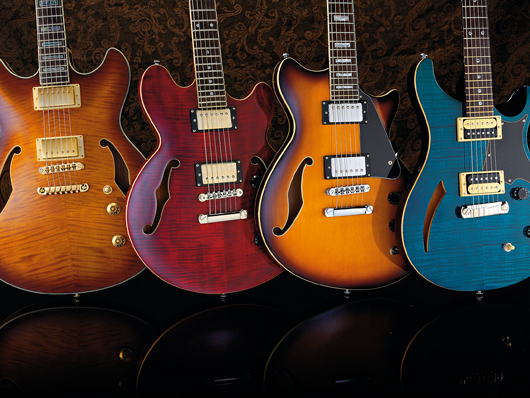
4 great-value semi-hollow electric guitars
An electric guitar with air in it is by no means a new concept. After all, attaching pickups to an archtop was how this whole Electric Spanish escapade - that’s non-Hawaiian electric guitars to you and me - kicked off in the first place.
As the 1950s rolled around solid guitars were the new innovation, but by 1958, and with traditionalist players still wanting a taste of the old, Gibson came up with the design that would define the electric-meets-acoustic guitar until this day: the ES-335. The result was a traditional-looking guitar that, crucially, proved more stable and resistant to feedback in the brave new electric world.
The industry standard
Gibson’s ES-335 is still the industry standard in the contemporary semi-hollow arena with its hollow wings and solid centre-block. It has an arched top and back (pressed laminates, not hand-carved from solid wood) and separate sides joined, like a traditional acoustic, with small linings. The centre-block firms up the design, giving a solid platform for the pickups and bridge, but also restricting the movement of the top and back, reducing that pesky feedback.
On the other hand, Fender’s semi-solid Telecaster Thinline, for example, was introduced a little further down the evolutionary line and played an integral role in the development of the ‘semi’ guitar concept: a design born out of necessity for weight reduction. Here the solid Telecaster body was routed out from the rear leaving a wide solid centre section; an f-hole was then added on the bass-side and the body was sealed with an additional back.
It reduced the weight of the solidbody Telecaster by nearly a half and, as ever, created a different tonality.
Construction methods
These two contrasting construction methods are still apparent today. PRS’s Hollowbody, for example, starts with a solid lump of mahogany that’s routed out to leave sides, back and a small block under the bridge. It’s then capped with either a solid spruce or maple top.
Taylor’s T3 takes a similar path. Collings’ City Limits is also constructed in a similar way from solid woods - it may look like an ES-335-style guitar, but it’s made in a very different way. All of which are mega money, of course, so over the next few pages we’re looking at four affordable guitars, each with its own take on the semi theme.
First up: ESP Xtone Paramount PS-2 price and spec
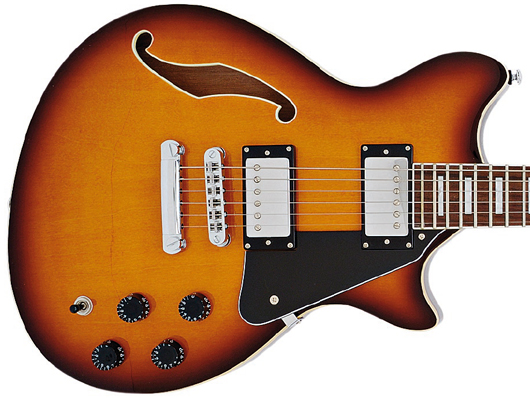
ESP Xtone Paramount PS-2 specifications
Spec
Price: £399
Origin: Korea
Body: Double-cutaway semi-hollow mahogany with maple top
Neck: Maple, set-neck with slim ‘U’ neck contour, 628mm (24.75-inch) scale length
Fingerboard: Bound rosewood with block inlays, 22 extra jumbo frets, 12-inch radius
Hardware: Chrome tune-o-matic-style bridge and stud tailpiece, ESP tuners
Electrics: ESP LH-150 (bridge and neck), three-way pickup selector switch, two master volume and tone controls
Options: The single-cut PS-1 costs £399. A new range for 2010 includes the up-spec PC guitars, single- and double-cut, with Bigsby from £1,079
Finishes: Two-tone sunburst (as reviewed), metallic gold, black
Next: ESP Xtone Paramount PS-2 build and features
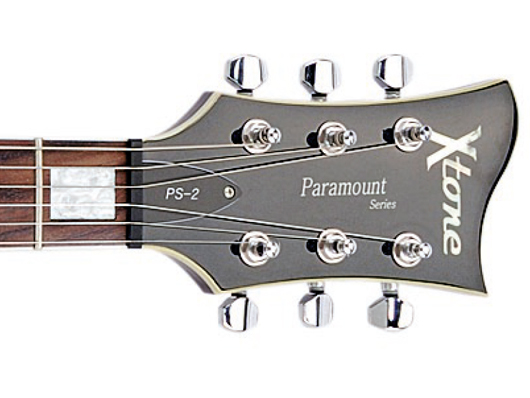
ESP Xtone Paramount PS-2 build and features
Build and features
ESP’s Xtone Paramount series is a small range of Korean-made, single- and double-cut electric semis. Like the PRS Custom Semi-Hollow, the PS-2’s body isn’t a normal hollowbody; a solid mahogany treble side is married with a large bass-side chamber.
Our sample is neatly finished in tobacco sunburst over a plain maple-veneered top. The binding around the f-hole is a little rough but, let’s not forget, it’s the least expensive on test. Size-wise it sits somewhere between our other guitars: longer and deeper than the PRS, but not as broad feeling as the Vintage or Ibanez.
It balances more like a solidbody on a strap - but at 3.9kg it’s no lightweight. The thin ‘U’-shape neck is typical ESP, it fills the back of the palm with plenty of wood to still give enough of an oldschool vibe without compromising speed or playability. The 22 huge frets are smartly finished and rounded, and the guitar plays extremely well.
Equipped with two ESP LH-150 humbuckers controlled by a three-way pickup selector switch and a tone and volume for each pickup, it’s very Gibson, including the tune-o-matic bridge and stud tailpiece.
Next: ESP Xtone Paramount PS-2 sounds, pros and cons
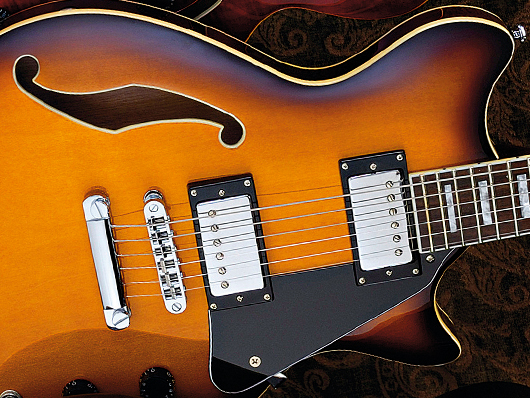
ESP Xtone Paramount PS-2 sounds, pros and cons
Sounds
Weighty with a solidbody-like feel, the bridge and neck pickups are nicely balanced with an emphasis on tight mids and a sprightly top-end. The bridge pickup has plenty of bite and with gain possesses quite a heavy rock tonality. You can achieve Southern rock charms or modern rock romps with relative ease.
The neck pickup is thicker and soupier in true old-school Gibson fashion. Under varying gains, even with overdrive and heavy distortion pedals, the amount of resonant feedback is minimal and the Xtone sounds like a girthsome solidbody.
Bridge pickup:
Both pickups:
Neck pickup:
Pros: Playability; classic and original semi-hollow looks; all-round rock tones.
Cons: Lack of true ‘semi’ character.
4 out of 5
Verdict: A simple, no-nonsense rock machine with semi-hollow looks and great playability.
Next: PRS SE Custom Semi-Hollow price and spec
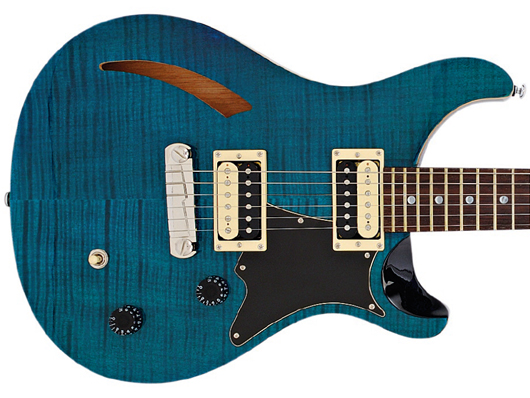
PRS SE Custom Semi-Hollow specifications
Spec
Price: £699
Origin: Korea
Body: Double-cutaway semi-hollow mahogany with maple top and flame maple veneer
Neck: Mahogany, set-neck, wide-fat profile
Fingerboard: Rosewood with dot inlays, 635mm (25-inch) scale length
Hardware: Chrome PRS designed Stop-Tail bridge, PRS logo’d tuners
Electrics: PRS designed Treble and Bass humbuckers, master volume and tone with three-way pickup selector
Options: None
Finishes: Blue matteo (as reviewed) black, natural, tobacco sunburst
Next: PRS SE Custom Semi-Hollow build and features
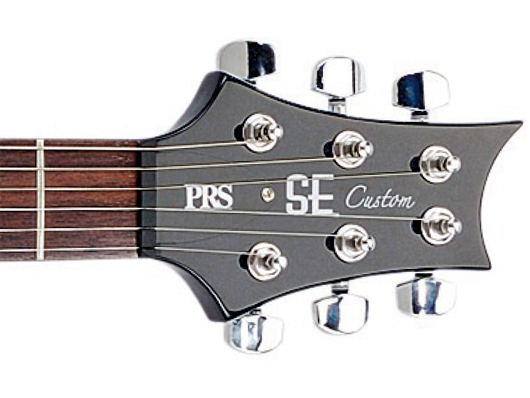
PRS SE Custom Semi-Hollow build and features
Build and features
Like the ESP, this Korean SE is not a traditional semi. Its back and sides are solid mahogany, the treble side is solid (with the exception of the control cavity) and the bass side chambered with a soundhole, although the centre-block stops below the bridge adding more air in the base of the body.
It’s topped with a solid maple slab, with ‘slash’ soundhole, that’s then faced with a figured maple veneer and hallmark natural edge ‘binding’ giving it that luxurious PRS look that matches its higher price.
With its PRS Custom outline, unbound 22-fret rosewood fingerboard and wide-fat mahogany neck it’s the most compact, solidbody-like guitar on review in terms of feel.
It features beautiful, pro-level build-quality - not a line out of place or hint of finish bleed - and is superbly set up. Our sample is finished in blue matteo - a now discontinued colour, but there are some still available in the UK - paired with a dark back and sides.
Next: PRS SE Custom Semi-Hollow sounds, pros and cons
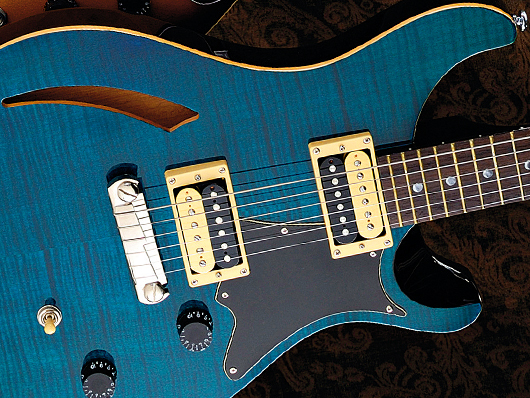
PRS SE Custom Semi-Hollow sounds, pros and cons
Sounds
It’s light and very nimble feeling in hand: a convincing semi with plenty of spring in its step. Even with a mild overdrive tone you can really hear the extra resonance of the chamber coming through. In any setting the Custom Semi-Hollow’s SE Treble bridge pickup has an open, expressive tone that begs for dynamic chords that meet with ringing sustain.
The neck SE Bass ’bucker, by comparison, is juicy and ideal for bluesy soloing. For those with jazzier tastes, the middle pickup position provides an almost acoustic, articulate and delicate tone that feels touch sensitive even with minimal gain. It can be edged into feedback at loud volumes and with more overdrive, but it’s easy to control and highly usable in certain rock-fuelled scenarios.
Bridge pickup:
Both pickups:
Neck pickup:
Pros: Great build; semihollow tones; posh-rock looks.
Cons: Very little. RRP is high, but check street prices.
Buy: PRS SE Custom Semi-Hollow is currently available from Thomann
4 out of 5
Verdict: Another cool model from PRS’s SE range that delivers boutique tone, feel and build quality for a snip under £700.
Next: Vintage Advance AV3H price and spec
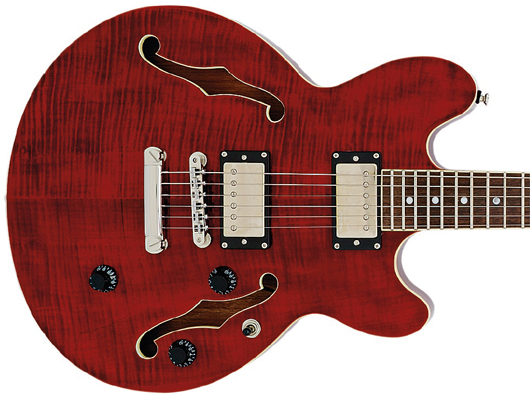
Vintage Advance AV3H specifications
Spec
Price: £479
Origin: China
Body: Double-cutaway semi-hollow mahogany with solid carved maple top and single ply binding
Neck: Mahogany, set-neck
Fingerboard: Bound rosewood with dot inlays, 22 frets, 628mm (24.75-inch) scale length
Hardware: Chrome tune-o-matic style bridge and stop-tail piece, Wilkinson WJ44
Electrics: Wilkinson WVCN (N) and WVCB (B) humbuckers, master volume and tone controls, ‘roll control’ (humbucker to single-coil)
Options: The AV3P (£499) features three P-90-style single-coils
Finishes: Cherry red flame maple (as reviewed) and natural flame maple
Next: Vintage Advance AV3H build and features
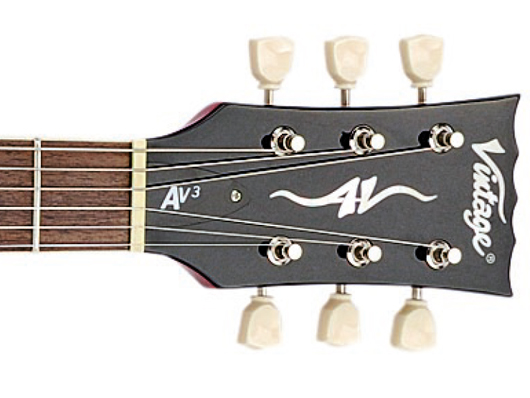
Vintage Advance AV3H build and features
Build and features
The AV3H takes its inspiration from the original ES-335, but with a unique twist thanks to its down-sized, offset double-cutaway design. It’s certainly one of Vintage’s more boutique-looking models and its reduced bulk gives a more nimble feeling on a strap.
As designer Trev Wilkinson says, “I can’t make a better ES-335, but I can make it smaller and more manageable.” Fair play.
What we have here is a threepiece mahogany back that’s chambered, leaving just a centre-block. The solid maple top is carved inside and out and then topped with a tight flame maple veneer. The mahogany neck is full and familiar feeling, a ‘C’ shape that’s the perfect middle ground between Gibson’s slim sixties and fatter fifties profiles.
Fit and finish is a little hurried in places; there’s the odd cherry bleed onto the binding and the Wilkinson tuners could feel a little more stable, but these very minor niggles are reflected in its modest price tag. A neat feature is the ‘roll control’, which enables both Wilkinson humbuckers to have a gradual transition from full humbucker to single-coil.
Next: Vintage Advance AV3H sounds, pros and cons
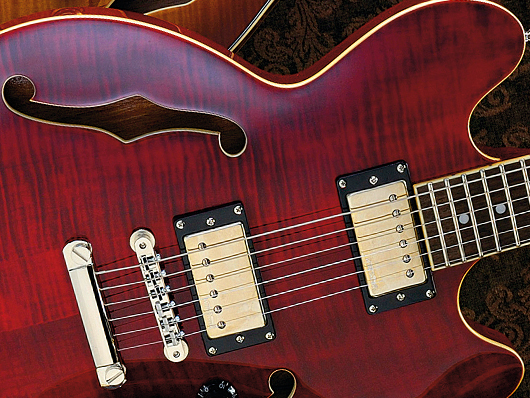
Vintage Advance AV3H sounds, pros and cons
Sounds
The AV3H’s big bass character is paired with plenty of snap and bite, which creates impressive versatility. To this end, you can produce full-on dirty, rock-fuelled humbucker sounds to a clean, country twang with a tweak of the roll control.
The AVH3 lets you go from Cream to clean as easily as it lets you go from open and dynamic jazz to biting punk. This ability to tailor your tone lends itself to sculpting rock and R&B sounds and, like an ES-335, it deals with most other tones with a touch of class too, albeit at a much more palatable price.
Bridge pickup:
Both pickups:
Neck pickup:
Pros: Versatile; great neck profile; comfortable ‘tweaked classic’ shape.
Cons: Slightly rushed finish in places.
4 out of 5
Verdict: An original take on the classic ES-335 that offers playability, tone to burn and genuine value.
Next: Ibanez Artcore AS93 price and spec
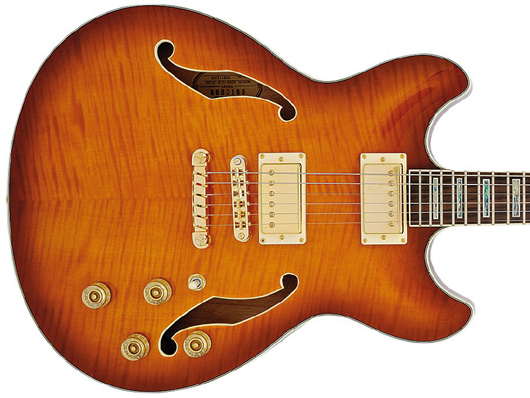
Ibanez Artcore AS93 specifications
Spec
Price: £449
Origin: China
Body: Double-cutaway semi-hollow, sycamore with flame sycamore top and double-ply pinstripe binding
Neck: Three-piece mahogany/maple neck, set-neck
Fingerboard: Bound rosewood with abalone block inlays, 22 medium, frets 24.75-inch scale length and 12-inch radius
Hardware: Gold tune-o-matic-style bridge and Quick Change tailpiece, gold tuners
Electrics: Artcore 1 and 2 humbucking pickups, two tone, two volume and three-way pickup selector switch
Options: The AS73B (£349) is a lower budget version of the AS93 and is only available in matt black; the AS73 (£348) comes in brown sunburst or ivory and features edge binding and Artcore humbuckers
Finishes: Violin sunburst (as reviewed)
Next: Ibanez Artcore AS93 build and features
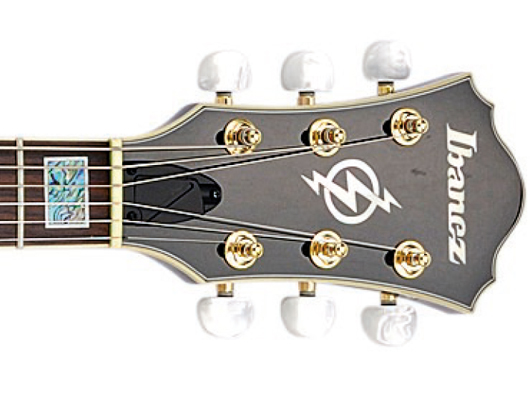
Ibanez Artcore AS93 build and features
Build and features
As with the Vintage, Ibanez’s AS93 is inspired by the ES-335. It’s a solid centre-block design but with laminated, flamed sycamore back, top and sides. The back and top has a subtle dishing where the neck pickup and heel join, revealing the neck heel and giving a lovely arch-top look.
The smartly bound neck isn’t the usual Ibanez affair but the violin ’burst backed, threepiece mahogany/maple neck lends itself to many styles. All the hardware is goldplated, Ibanez logo’d tuners straddle the classic Ibanez headstock and fit in perfectly with the overall posh look.
Control-wise we have the classic two-volume/two-tone layout, with a three-way toggle to switch the two Artcore ceramic-loaded humbuckers. The AS93’s forward strap button is located into the heel (like an ES-335) and, for those new to the semi-hollow arena, will provide a very different balance to a solidbody.
Next: Ibanez Artcore AS93 sounds, pros and cons
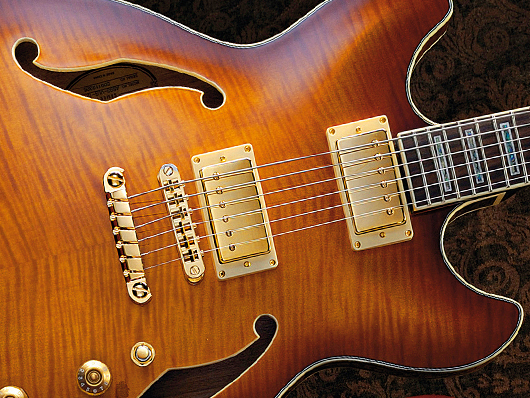
Ibanez Artcore AS93 sounds, pros and cons
Sounds
The AS93 is lightweight and less bulky feeling than an ES-335 and it retains a bright acoustic resonance. With a clean tone the medium output bridge pickup displays a clean edge right from the off - it’s certainly less dense than a contemporary ES-335.
Though bright, there’s a nasally core that’s key to the semi-hollow vibe and prevents things from getting too clinical or glassy. It’s a perfect platform for anything from John Scofield’s angular fusion to modern pop and indie. With more gain, it’s easy to launch into those classic sixties riffs and here the AS93 provides the perfect, if a little tight, tone to do so, while offering a more focused chord response.
The neck and middle selections offer a more rounded response, with the neck offering a dynamic response for finger picking and soulful blues licks.
Bridge pickup:
Both pickups:
Neck pickup:
Pros: Build; light weight; value; old-school semi voicing.
Cons: Fancy looks aren’t for everyone.
Buy: Ibanez Artcore AS93 is currently available from Andertons Music Co., PMT Online and Thomann
4 out of 5
Verdict: The AS93 is a serious guitar that pitches its own voice and style into the semi-hollow arena. It’s a real treat for under £500.
Next: The verdict - which great-value semi-hollow electric is best?

The verdict - which great-value semi-hollow electric is best?
Verdict
So then, four guitars that can all be classed as semis, but each with its own distinct character in terms of construction, feel, sound and playability.
The Xtone PS-2 is impressive in terms of its good build, more solidbody feel and overall playability. Of the four, it’s the one more likely to appeal to those with heavy rock tastes who want to acquire the classic look of the semi-hollow, but still rock hard.
PRS’s SE Custom Semi- Hollow instantly gives you classy PRS looks with masses of vibe and fabulous build quality, all in a compact package that’s a sniff under £700 and much cheaper on the street. Here’s a guitar that might feel like a solidbody but really works like a good semi. This isn’t an easy feat to achieve, but it’s proof that PRS’s SE line is about more than just building affordable versions of its USA guitars - this one is unique.
Vintage’s AV3H might not be in the same league as the PRS in terms of fit and finish but it’s one of our favourite models in the brand’s ‘Advance’ line. It could almost be the perfect semi/solid hybrid - it’s nimble, the neck is ideal and it offers almost every variant of semihollow tones possible. Even with its minor finishing issues, the AV3H could be a mainstay in anyone’s collection.
Finally, there’s the Ibanez AS93, which is the most mature-feeling of our quartet, with its posh, ES-335-inspired stylings. It takes less risks with the hallowed semi formula and offers a brighter tonal palette, an arch-top-meets-semi feel and good value for money. It’d suit anyone from rebellious rock’n’roll cats to aspiring funky fusioneers with its bling-meets-sing vibe.
If you don’t already have a semi in your collection, it might be time to wise-up and add some air to your sound. No clear winner here - just four great places to start your journey.
Liked this? Now read: 22 badass electric guitars under £400
Connect with MusicRadar: via Twitter, Facebook and YouTube
Get MusicRadar straight to your inbox: Sign up for the free weekly newsletter